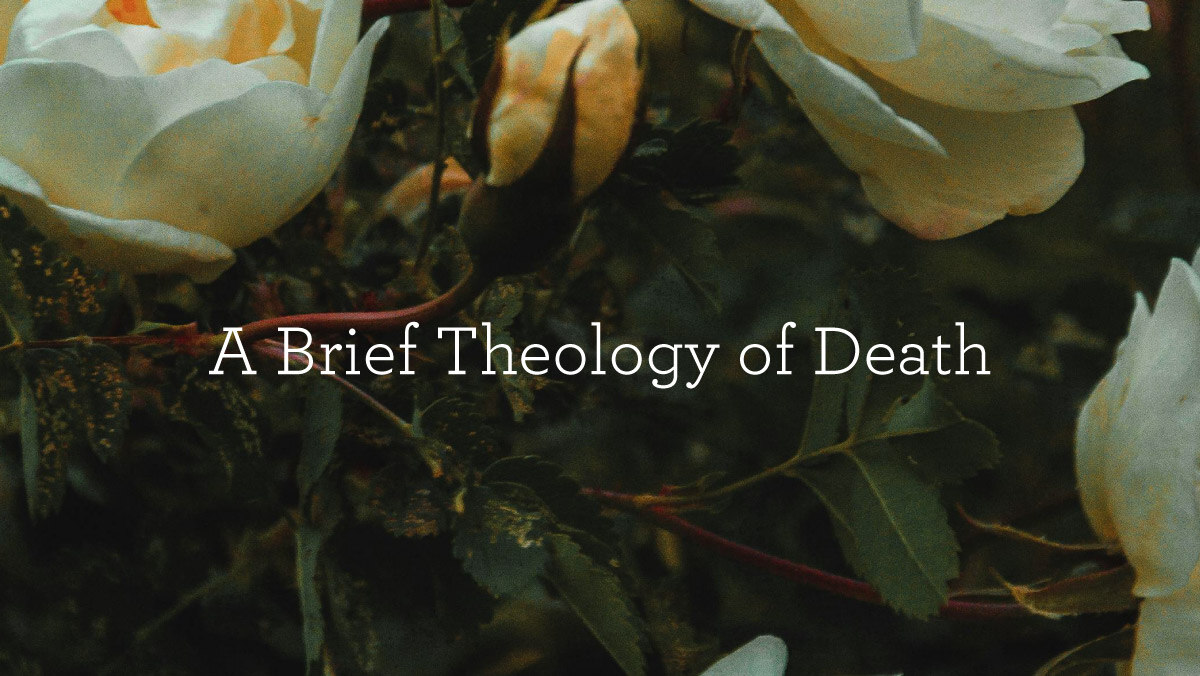A Brief Theology of Death
The late atheist Christopher Hitchens once described the unusual circumstances under which he came to terms with death: “It was only when I watched [my son] being born,” he comments, “that I knew at once that my own funeral director had very suddenly, but quite unmistakably, stepped onto the stage.”
We usually avoid thinking or talking about death and dying. The reasons are numerous. We grieve at the deaths of our loved ones, perhaps because their deaths show us a glimpse of our own unavoidable end. Others view death with fear, uncertain about what is to come.
The Bible, though, has a different view. The writer of Ecclesiastes, for example, says it’s better to go to a funeral than a party, “because the living should always remind themselves that death is waiting for us all” (Eccl. 7:2 GNT). Rather than avoid the thought, the Old Testament writer urges us to reflect soberly upon it.
Since death is a fact we must face—and face it we eventually will—Psalm 90 gives counsel for God’s people on this side of eternity. Really, the psalmist raises and answers two crucial questions: Why does death come around so quickly? And why do we have to die at all?
Our Unchanging Dwelling Place
We’re introduced to the author of Psalm 90 right away: “A Prayer of Moses, the man of God.” Moses, who led the people out of Egypt and through the wilderness, must have composed the psalm somewhere along the journey—and he begins by addressing God as the eternal, unchanging, and immortal God: “Lord, you have been our dwelling place in all generations” (v. 1).
If we think about that phrase for a moment and the context in which it was written, we know Israel had no dwelling place at this point. They were in the wilderness, setting up and then packing up as they went. But these realities didn’t alter the fact that God, not Israel’s earthly dwellings, was their dwelling place.
Those in Christ find their dwelling place in God Himself.
And God continues this way with believers. Those in Christ find their dwelling place in God Himself. Our “life is hidden with Christ in God” (Col. 3:3); our “citizenship is in heaven” (Phil. 3:20).
God’s Immortality and Man’s Brevity
The psalm goes on to describe God’s immortality in terms of His eternality (v. 2). In reflecting on God, we’re often tempted to begin with ourselves and then extrapolate out to Him. But it’s instead when we descend from (to quote Spurgeon) “a devout musing upon the subject of the Godhead” that we can understand our purpose. And this is what the psalmist does. Before the earth and its features were created—before the formation of the Grand Canyon or the pyramids or Stonehenge—Moses reminds us that there was the everlasting God.
Immediately, the psalm contrasts the eternal God with mortal man, who returns to the dust from which he was created (v. 3)—an allusion to the early chapters of Genesis. It’s for this reason that in funerals, the words of committal include “And now we commit the body of our dear brother to the ground, ashes to ashes, dust to dust.”
The prospect of our mortality, when contrasted with God’s eternality, puts our short lives into perspective. Even if we were to live for a thousand years, that would be nothing to the God who sees a millennium as but one day (2 Peter 3:8). It would be like how a billionaire views a hundred-dollar bill: a drop in the bucket compared to his total portfolio. Most of us have seventy or maybe eighty years (Ps. 90:10). That’s a life: gone!
Man’s mortality, contrasted with God’s eternality, puts our short lives into perspective
Thinking in this way isn’t some form of morbid introspection. The realism the psalm provides is necessary to bring foolish, self-centered humanity to our senses. We see it time and time again in the Bible:
O LORD, make me know my end
and what is the measure of my days;
let me know how fleeting I am! (Ps. 39:4)
My days are swifter than a weaver’s shuttle,
and come to their end without hope. (Job 7:6)
What is your life? For you are a mist that appears for a little time and then vanishes. (James 4:14)
God’s Wrath and Man’s Sin
Having spoken to the felt brevity of life, the psalmist moves to consider a second question: Why do we have to die? Neither the atheist nor the secularist has an explanation. The Bible has the answer. Psalm 90:7 says, “We are brought to an end by your anger; by your wrath we are dismayed.” In other words, death entered the world through sin (Gen. 2:17). And death is the punishment for man’s rebellion.
It makes sense. God—who is perfect, immutable, eternal, perfect in justice and wisdom—isn’t indifferent to man’s rebellion. We don’t want an indifferent God, much like how we wouldn’t want to play golf with someone who says there are no rules. Rather than sweeping our rebellion under the rug and saying it doesn’t matter, God deals with it, because it does matter.
The settled reaction of God is revealed, the psalmist tells us, not only in the passing of time but in the reality of our guilt: “You have set our iniquities before you, our secret sins in the light of your presence” (v. 8). In verse 11, too, he asks, “Who considers the power of your anger, and your wrath according to the fear of you?”
In short, the notions of death and guilt are inseparable. Whenever we think carefully on death, we will also have to reckon with the guilt we’ve incurred in relation to God. The culture explains away death with axioms like “Well, it’s just inevitable” or “There’s nothing to fear because there’s nothing here.” But the biblical worldview says that after death, we will stand before the God against whom we’ve sinned—and unless He does something on our behalf, we die under His wrath and without hope.
Making the Psalmist’s Requests Our Own
Fittingly, the psalm ends with a string of requests from the psalmist and to the everlasting God. As we reflect on death and dying, we would be helped to make the psalmist’s requests our own.
First, Moses prays to God, “Teach us to number our days that we may get a heart of wisdom” (v. 12). He isn’t asking for increased mathematical acumen; he’s requesting godly wisdom. Like all of us, he needs to be taught.
Part of the nature of our rebellion against God is that we don’t want His wisdom. We reject thinking His thoughts after Him (Rom. 1:21–22). Humbly, then, we need to approach God and ask. The wise person doesn’t avoid thinking about death; he filters the prospect through God’s Word, God’s promises, and God’s wisdom: “Teach us…”
Next, Moses prayers that God would “satisfy us in the morning with your steadfast love, that we may rejoice and be glad all our days” (v. 14). The context of this psalm makes this verse precious. The psalmist has come to terms with God’s immortality (v. 2), man’s frailty (v. 3), and the relationship of God’s wrath to man’s sin (vv. 7–11). And now he prays, “Lord, satisfy us and make us glad in you.”
We know in full what Moses, writing at this time in history, knew only in part: God’s covenant love finds its fulfillment in “the Lamb of God, who takes away the sin of the world” (John 1:29). For the Christian, our death has been handled by the death of another; our life is found in the life of another.
This is our hope in death: God in Christ has entered into our realm of rebellion, suffering, and sin. He’s taken upon Himself these things so that those who turn to Him in repentance and faith need not fear death but can actually rest in the death and resurrection of the Lord Jesus.
Perhaps you’re in your early decades of life, and the notion of death is far off. Gaining a heart of wisdom means not waiting until you’re older to reckon with matters of eternity. “Remember … your Creator in the days of your youth,” the writer of Ecclesiastes urges you, “before the evil days come” (12:1).
Gaining a heart of wisdom means not waiting until you’re older to reckon with matters of eternity.
And to the old, for whom death is a real prospect: now is the time! Today is the day of salvation (2 Cor. 6:2). Make the psalmist’s prayer your own: “Make us glad for as many days as you have afflicted us” (v. 15). He will surely do it.
This article was adapted from the sermon “Frail as Summer’s Flower” by Alistair Begg.




